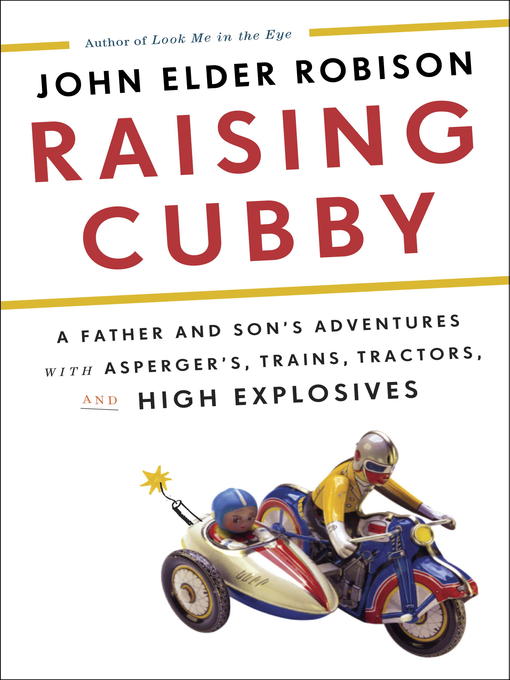
Raising Cubby
A Father and Son's Adventures with Asperger's, Trains, Tractors, and High Explosives
کتاب های مرتبط
- اطلاعات
- نقد و بررسی
- دیدگاه کاربران
نقد و بررسی

November 26, 2012
Robison's third book starts with a bangâhis description of the "malicious explosion" created by his teenage Cubby that has the boy, who has Asperger's syndrome, looking at 60 years in prison, is as disconcerting as it is captivating. Sadly, much of the book drops off from there as the author segues into the personal story of his own transition from adolescence to adulthood. While the social problems he encounters because he, too, has Aspergers, are appealing, the stories of his business dealings lack the appeal of Cubby's journey. The tales of bringing up his son, which are relayed in 55 short chapter-length vignettes and told in the accessible prose that made his book Look Me in the Eye, a New York Times bestseller, are decidedly hit or miss. For instance, "Tuck-in Time," which simply explains that kids like bedtime stories, gives little insight into Aspergers or to Cubby's personality. On the other hand, "Cubby Versus the School" and "Reading" give a personal and informative perspective on the challenges kids with Cubby's condition face when it comes to acceptance and learning. The story picks up in the last 100 pages, as Cubby, a brilliant kid with an inquisitive scientific mind, creates explosive chemistry experiments that bring charges from the local DA. With the ensuing investigation and trial, Cubby and the author are drawn into a crazy world that threatens to tear apart their already delicate lives and allows the book to live up to the promise of its exciting first five pages. Agent: Christopher Schelling, Selectric Artists.

December 1, 2012
A father reflects on the "tumultuous father-son journey" that he and his son have shared. In this alternately funny and moving memoir, a follow-up to his 2007 best-seller, Look Me in the Eye, Robison (Be Different, 2012, etc.) discusses how he dealt with the joys and challenges of fatherhood. As he relates, these were exacerbated by his own social inadequacies and those of his son, both of whom are Aspergian and suffer from "blindness to the nonverbal signals of others." The author reveals his thought processes as he struggled to share his painfully arrived-at social insights with his son in order to help him navigate a fulfilling life. Though his early life was rocky, Robison became a successful electrical engineer. Although he had not completed high school, he worked on sound and lighting effects for Kiss and other top rock bands of the 1970s. Later, he designed computer games before opening his own business restoring and servicing high-end European cars. When his son was born in 1990, fatherhood proved to be more of a challenge. Beginning with his efforts to understand why his baby was crying, he describes the trial-and-error problem-solving approach that he used to compensate for his inability to intuit social signals. In 2007, his 17-year-old son, who had a basement chemistry lab, was arrested for "possessing explosives with intent to harm people or property." Although he was ultimately exonerated, Robison believes that targeting his son was an example of political grandstanding by the prosecution and a failure of the justice system. A warmhearted, appealing account by a masterful storyteller.
COPYRIGHT(2012) Kirkus Reviews, ALL RIGHTS RESERVED.

February 15, 2013
In his memoir Look Me in the Eye (2007), Robison wrote about his own Asperger's syndromehe was diagnosed with the form of autism when he was 40 years old. Here he asks the question: How does a man who lacks a sense of empathy and an ability to read nonverbal cues learn to be a father? And how does a man with Asperger's learn to recognize the same symptoms in his own child? (A key element in the book is Robison's son's own diagnosis, and Robison's reaction to his having missed seeing the signs for as long as he had.) In many ways, this is a traditional father-and-son memoir, but the added element of Asperger's gives the story a stronger emotional core: when Robison and his wife separated, for example, he realized he had been misreading a lot of what had been going on between them. It's a story of a man learning to be a parent, yes, but it's alsoand perhaps more importantlythe story of a man discovering, as an adult, who he really is.(Reprinted with permission of Booklist, copyright 2013, American Library Association.)

























دیدگاه کاربران